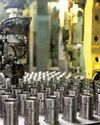
INDIAN Institute of Technology, Madras (IIT Madras) has reinvented the B.Tech curriculum to help its students meet the demands of modern and technological developments. The hallmark of this curriculum is flexibility. Students can choose about 40 per cent of their courses, which enables customisation and personalisation. The changes are focused on preparing students for jobs, driving research and innovation and encouraging entrepreneurship.
The institute has implemented the recommendations of its Curriculum Task Force, introducing more interdisciplinary learning, hands-on projects and entrepreneurship opportunities from the second year of the B.Tech programme. This change aims to provide students with a more comprehensive and practical education.
V. Kamakoti, Director of IIT Madras, explains the significance of these changes in the context of Industry 4.0. He says, "Curriculum should align with industry requirements and the current needs of the nation. In the wake of Covid, Industry 4.0 and 5G, there have been certain fundamental changes in the basic building blocks of technology. And that warrants a new outlook on what we need to do and how to do it. Keeping this in mind, we have started doing certain exploratory things. It's students' careers that we keep in mind." One of the key changes is that only 60 per cent of the total credits will be core subjects.
The remaining 40 per cent, students are free to choose. "When choices are being made, students should make informed decisions about what they are doing. But that is not happening.
This story is from the {{IssueName}} edition of {{MagazineName}}.
Start your 7-day Magzter GOLD free trial to access thousands of curated premium stories, and 9,000+ magazines and newspapers.
Already a subscriber ? Sign In
This story is from the {{IssueName}} edition of {{MagazineName}}.
Start your 7-day Magzter GOLD free trial to access thousands of curated premium stories, and 9,000+ magazines and newspapers.
Already a subscriber? Sign In

MEMORIES & IMPRESSIONS
Ratan Tata was an exceptional human being. He was a visionary leader, esteemed industrialist, and a humanitarian, who left an indelible mark on India and the world.

The Robotaxi Market
The robotaxi market is shaping up to be a high-stakes battleground as tech giants and automakers race to transform urban mobility.

And the Nobel Prize Goes to AI
The recent Nobel Prize T awards to AI pioneers affiliated with Google have sparked a broader conversation about Big Tech's influence on research and the limitations of traditional prize categories.

Ola Electrified
Once considered a trailblazer in India’s electric vehicle (EV) ecosystem, Bhavish Aggarwal’s Ola Electric now faces a major accountability crisis.

Sharp Slide in Industrial Output on Eve of Deepavali
India’s index of industrial production (IIP) saw a sharp reversal in August, contracting by 0.1 per cent, in stark contrast to the 4.7 per cent growth in July, mostly because of significant contractions in mining and electricity generation.

Heralding the Solar Era with Sustainable Electrification
RAJEEV KASHYAP on the economics of solar power, the hurdles in scaling it, and much more

A WELL-GREASED MACHINE
The OmniBook X14 laptop runs on first-generation Snapdragon X Elite, which bets big on Al-enabled productivity and battery life, but falls short when it comes to overall experience, says Deep Majumdar

DO NOT LETA HEALTH CRISIS RUIN YOUR FINANCIAL HEALTH
For a family of four living in a metro, it is recommended to opt for a family floater health insurance plan with a sum insured of at least Rs 15-20 lakh

Disruption Ahead: Beyond Organisation Charts and Structures
ALBERT EINSTEIN FAMOUSLY said, “We cannot solve our problems with the same thinking we used when we created them.

Dr. Rahul Shivajirao Kadam: A Visionary Leader Blending Sustainability, Innovation, And Social Empowerment
We are on the stage of global warming, and these technologies not only help prevent further damage but also leave behind a better environment for future generations.